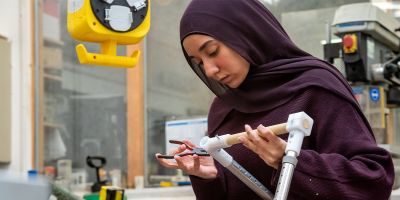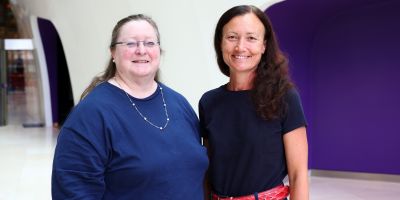EU Project promotes new generation of environmentally-friendly aircraft
The University of Leeds' Faculty of Engineering will lead a new EU research project to develop the design tools needed for the next generation of environmentally friendly aircraft.
The AMEDEO (Aerospace Multidisciplinarity-Enabling DEsign Optimisation) project will improve the design of aircraft engines and fuselages to improve fuel and build efficiency. Leeds will work with eleven other top industry and academic partners across Europe [1].
Funded as part of the EU’s Marie Curie research programme [2], AMEDEO will train 13 early-stage research engineers in Multidisciplinary Design Optimisation (MDO). The technique has been identified by the European Commission as critical for the future sustainability of the European aerospace industry[3].
The method allows coordination of sophisticated computer models in individual areas such as aerodynamics, structural mechanics, heat transfer and acoustics into the design process as a whole. By optimising the overall design rather than individual elements, MDO ensures that one area is not optimised at the expense of other features.
Prof Vassili Toropov of Leeds’ Faculty of Engineering, who is leading the project, said: “By getting the design right first time, you can reduce the number of prototypes you go through, reducing both manufacturing and operation costs. You can also use the method to really fine tune the aircraft design, meaning we can get at new energy efficiency designs that increase environmental sustainability.”
AMEDEO is currently in the final stages of a search for talented young engineers to train in this important area. The recruits will undertake individual projects, each lasting 3 years, that are closely aligned to key issues and challenges facing the European aerospace industry, including:
• Robust optimisation of aircraft engines for energy efficiency
• Optimisation of lightweight composite aircraft structures
• Improvement of aircraft safety and crashworthiness
• Noise reduction through acoustic optimisation.
Further information
For further information about AMEDEO please contact:
Professor Vassili Toropov, AMEDEO Coordinator (V.V.Toropov@leeds.ac.uk, tel 0044 113 343 2272)
Juliet Jopson, AMEDEO Project Manager (S.J.Jopson@leeds.ac.uk, tel 0044 113 343 2061)
[1] Project partners
The network is coordinated by Professor Vassili Toropov, jointly from the School of Civil Engineering and the School of Mechanical Engineering, Dr Rob Hewson and Professor Harvey Thompson from the School of Mechanical Engineering at the University of Leeds. The network will run until September 2016 and comprises 12 world leading partners from 6 countries, including:
• The University of Leeds, Rolls Royce and Altair Engineering from the UK
• Delft University of Technology and Advanced Lightweight Engineering from the Netherlands
• The von Karman Institute from Belgium
• The Technical University of Munich, DLR (German Aerospace Agency) and SFE GmbH from Germany
• ONERA (French National Aerospace Agency) and Airbus from France
• Koç University from Turkey.
[2] Marie Curie Actions is the ‘People’ focused section of the European Commission’s 7th Framework Programme for research funding. Marie Curie funding aims to attract, train and develop the brightest research talent for Europe. AMEDEO fits into the Marie Curie Initial Training Network (ITN) thread of funding. For further information on Marie Curie Actions: http://ec.europa.eu/research/mariecurieactions/
[3] Flightpath 2050. Europe’s Vision for Aviation. Report of the high level group on aviation research. European Commission (2011), http://ec.europa.eu/transport/modes/air/doc/flightpath2050.pdf




